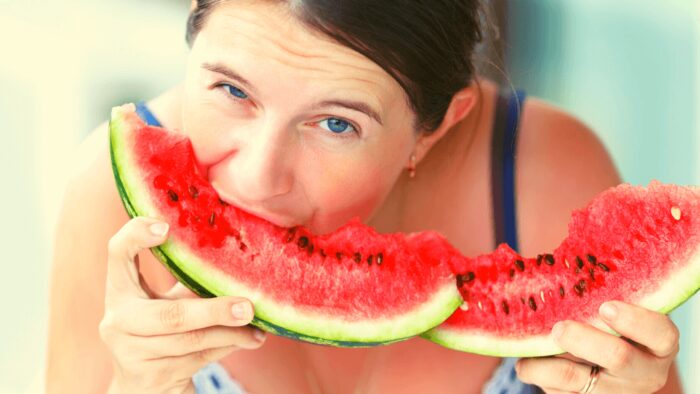Watermelon for Vitamins and Minerals [Great for Kids]
Watermelon is a delicious fruit that is not only tasty but very healthy. It comes in an amazing array of colors, from deep red to pale pink and bright yellow, making it the perfect healthy snack when you are feeling peckish or when you want something sweet after dinner.
Frozen cubes of watermelon juice make the perfect iced tea with a twist and add an unexpected sweet kick to punchy dressings and vinaigrettes.

Watermelon Is High In Vitamins and Minerals
Particularly rich in vitamin A, watermelon is also high in vitamin C, providing around 29% of your recommended daily allowance. Watermelon is low in fat and contains only 30 calories per 100 grams, making it a guilt-free way to satisfy your sweet tooth. It also provides potassium, thiamine, niacin and magnesium all for under 50kcal per serving.
Lycopene
It is also one of the most easily accessed sources of lycopene, an antioxidant that gives fruit and vegetables their red color. Lycopene has been found to help prevent a number of diseases including breast cancer, prostate cancer, and heart disease.
Citrulline
In addition, watermelon can help prevent urinary tract infections because of its high water content and diuretic properties. It also contains the mineral citrulline which may help to reduce blood pressure and lower the risk of developing Alzheimer’s disease. There is currently ongoing research into the potential health benefits of citrulline, which include improved nerve function.
Organic Watermelon Is Best
To maximize the benefits of your watermelon, try and choose organic options whenever possible. If you use pesticides, these can concentrate in certain fruits and vegetables (including watermelon), which can lead to an unhealthy intake of chemicals.
Watermelon Storage
When you are storing your watermelon, make sure not to store it near bananas as the ethylene gas given off by the fruit will cause the flesh of both fruits to turn brown. If you do find that your watermelon has become brown, don’t worry! You can still enjoy it. Just cut away the brown parts and enjoy the rest!
Here are 8 Benefits Of Eating Watermelon
- Contains L-citrulline, which can help you make more nitric oxide to improve blood flow and may even fight inflammation.
- Has diuretic properties help rid the body of excess salts, uric acid, and water that could lead to urinary tract infections.
- High in vitamin A which can aid healthy vision, skin, and cell growth.
- It’s a good source of C which boosts the immune system, aids iron absorption, and maintains a healthy gut.
- Contains magnesium, which contributes to the healthy functioning of your heart and nervous system, boosts energy levels, and can help you sleep.
- Contains thiamine, essential for maintaining a healthy metabolism.
- Potassium helps maintain fluid balance in the body, supports muscle function, and has been shown to reduce high blood pressure.
- Helps to balance body fluids and electrolytes.
Watermelon is a tasty and extremely healthy snack! Make sure you don’t miss out on this wonderful fruit next time you’re feeling peckish or need something sweet after dinner. Its refreshing nature makes it perfect for those hot summer days and long, lazy picnics in the sunshine.
